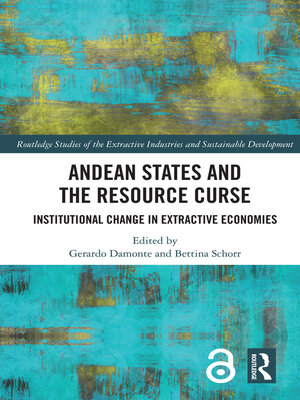Andean States and the Resource Curse
ebook ∣ Institutional Change in Extractive Economies · Routledge Studies of the Extractive Industries and Sustainable Development
By Gerardo Damonte

Sign up to save your library
With an OverDrive account, you can save your favorite libraries for at-a-glance information about availability. Find out more about OverDrive accounts.
Find this title in Libby, the library reading app by OverDrive.



Search for a digital library with this title
Title found at these libraries:
| Loading... |
This volume explores institutional change and performance in the resource-rich Andean countries during the last resource boom and in the early post-boom years.
The latest global commodity boom has profoundly marked the face of the resource-rich Andean region, significantly contributing to economic growth and notable reductions of poverty and income inequality. The boom also constituted a period of important institutional change, with these new institutions sharing the potential of preventing or mitigating the maladies extractive economies tend to suffer from, generally denominated as the "resource curse". This volume explores these institutional changes in the Andean region to identify the factors that have shaped their emergence and to assess their performance. The interdisciplinary and comparative perspective of the chapters in this book provide fine-grained analyses of different new institutions introduced in the Andean countries and discusses their findings in the light of the resource curse approach. They argue that institutional change and performance depend upon a much larger set of factors than those generally identified by the resource curse literature. Different, domestic and external, economic, political and cultural factors such as ideological positions of decision-makers, international pressure or informal practices have shaped institutional dynamics in the region. Altogether, these findings emphasize the importance of nuanced and contextualized analysis to better understand institutional dynamics in the context of extractive economies.
This book will be of great interest to students and scholars of the extractive industries, natural resource management, political economics, Latin American studies and sustainable development.
The Open Access version of this book, available at www.taylorfrancis.com, has been made available under a Creative Commons Attribution-Non Commercial-No Derivatives 4.0 license.






